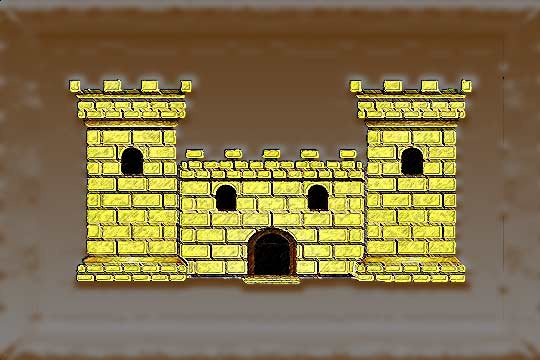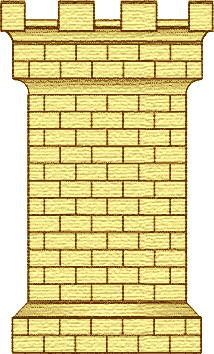Iklaina, Pylos - Nestor, Messenia,Peloponnese
Castle of Iklaina
| Location: |
| Under the church of the village Iklena of Messinia, north of Pylos |
| Region > Prefecture: |  |
| Peloponnese Messenia | |
| Municipality > Town: | |
| City of Pylos - Nestor • Iklaina | |
| Altitude: | |
| Elevation ≈ 180 m |
| Time of Construction | Origin | |
| probably 1407 | VENETIAN |
|
| Castle Type | Condition | |
| Castle Ruins |
In Ruins
|
Remains of a Venetian fortification in the village Iklaina, north of Pylos. The remains are still standing in some height and length, although not easily spotted (because they are used as a support wall for the yard of the church of the village).
History
In the beginning of Fankokratia, during the process of loot sharing and of the division of territories among the Franks, Iklaina passed under the control of the Latin bishop of Methoni (Modon). This was decided by Pope Innocent III in 2112, and it was the first historical occurrence of the village.
In the meantime, after the treaty of Sapienza of 1209 (between Franks and Venetians), the southwestern tip of Messinia, including Koron and Modon, was acquired by the Venetians. So Iklaina (belonging to the bishop of the Venetian Modon) was during the entire Frankokratia in a strange status: it was a Venetian property in Frankish territory.
It is not known when exactly the castle was built (which is ignored by historic sources). Most probably it was not built in the 13th neither the 14th century due to its ambiguous position. We believe that it was built in the beginning of the 15th century.
Around the end of the 14th century, in the time of the Navarrese dominance in the Principality of Achaea, the rights of the Venetians were not respected, apparently. We know this from the efforts of Lodovico Morosini bishop of Modon (1390-1407) to regain control. The Venetian rights were reestablished in 1402 but in 1406 the Greeks of the Despotate of Mystras invaded the Venetian and Frankish territories and burned some villages. Iklaina was one of them.
After that, in order to prevent the return of the Greeks, the new bishop of Modon (as of 1407) Antoine Correr built (or re-built) the castle of Iklaina.
In 1417, the Frankish nobleman Adam de Melpignano appeared in the area as a representative of the Prince of Achaea Centurione II Zaccaria and took over some Frankish fiefs. In addition to other lands, he made an agreement with the Venetians of Modon and undertook the administration of some Venetian fiefs as well, including Iklaina.
In 1423, after the complete prevalence of Byzantines in Peloponnese (except the Venetian lands), Adam de Melpignano remained the last and only Frankish lord in Peloponnese, obviously favored and spared due to his Venetian connections. He knew however that he could not last long, so in the spring of 1423 he raised the Venetian flag in his castle Molines (probably the Debridge) and ceded his fiefs to Venetia in exchange for Venetian citizenship (and protection). So Iklaina became for several decades a purely Venetian possession. This period lasted until 1500, maximum, when the Ottomans conquered the last Venetian castles in Morea: Modon and Koron.
Structure, Fortification & Buildings
The preserved walls are part of the retaining wall that supports the yard of the church Agios Ioannis. They stretch to a length of about 60m, at a height of several meters.
At some points, inevitably, there are recent additions to the retaining wall.
The upper part of the wall has been demolished to form the basis for the paved yard and the railings.
These walls were probably the fortification of the keep or of the citadel. To some distance are found the remains of other walls that could have been part of an exterior curtain wall.

red colour: the preserved walls
| First entry in Kastrologos: | January 2020 |
Sources
- Pictures and info by Mr. Yorgos Kostopoulos, December 2019
- Antoine Bon, 1969, La Morée franque. Recherches historiques, topographiques et archéologiques sur la principauté d'Achaïe (1205-1430), Editions de Boccard, pp.283-284, 290,291,426,429,431-432
- Γιάννης Μπίρης, άρθρο στην εφημερίδα ΕΛΕΥΘΕΡΙΑ (26 Αυγούστου 2019) - Κάστρα και οχυρά της Μεσσηνίας: Το κάστρο της Ικλαινας
- Website of the municipality of Pylos - Nestor - ΚΑΣΤΡΑ ΚΑΙ ΟΧΥΡΑ ΤΗΣ ΜΕΣΣΗΝΙΑΣ Το κάστρο της Ικλαινας
|
|
| Access |
|---|
| Approach to the monument: |
| The remains of the castle are at the centre of the village, below the church. Iklaina is north of Pylos, about 12km. |
| Entrance: |
| Free access |






















